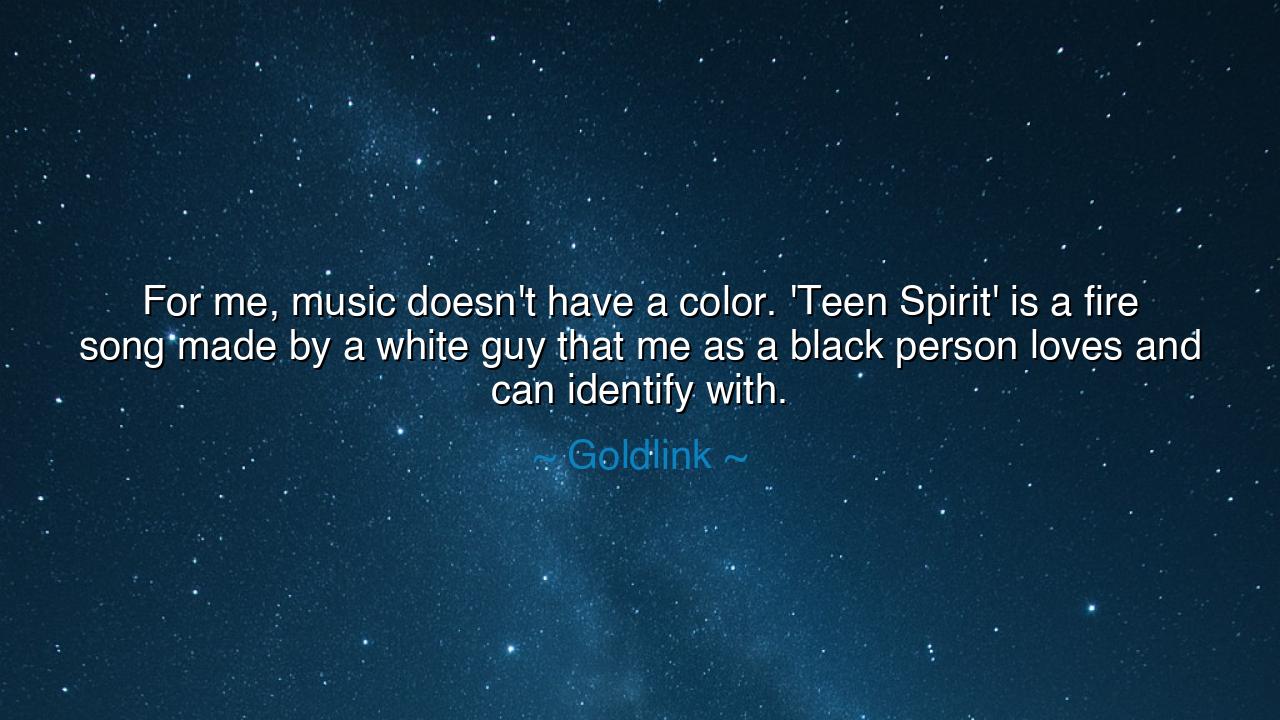
For me, music doesn't have a color. 'Teen Spirit' is a fire song
For me, music doesn't have a color. 'Teen Spirit' is a fire song made by a white guy that me as a black person loves and can identify with.






Hear the voice of Goldlink, who declared with strength and clarity: “For me, music doesn’t have a color. ‘Teen Spirit’ is a fire song made by a white guy that me as a black person loves and can identify with.” At first, these words seem simple praise for a song, but within them is a truth as old as humanity: that art transcends the boundaries men create, that the song of the soul knows no skin, no race, no border.
When he speaks of music having no color, he rejects the divisions that the world often imposes. Too often, men have chained art to identity, saying, “This belongs to us,” or, “That belongs to them.” Yet music, born of the heart, is for all hearts. The cry of a voice, the strike of a drum, the resonance of a guitar—these belong not to one race, but to the shared spirit of humanity. Goldlink, a black artist, finds himself deeply moved by ‘Teen Spirit’, a song birthed from the anguish and rebellion of Kurt Cobain, a white man. In that connection, all barriers fall, and only the common fire of truth remains.
Consider the history of song itself. Jazz, born in the pain and triumph of African-American communities, spread to the world, embraced by every nation and every race. Beethoven, a German, composed symphonies that stirred the souls of listeners far beyond Europe. Even in the ancient world, Greek melodies inspired Roman poets, and Persian rhythms touched Indian courts. Music has always been the bridge over divides, carrying with it the deepest emotions of mankind.
Goldlink’s reflection also carries the echo of rebellion, much like ‘Teen Spirit’ itself. That song, born in the grunge era of the 1990s, carried the voice of disillusioned youth. Though it came from the hands of a white man in Seattle, its cry of frustration, longing, and resistance struck Goldlink’s heart decades later, across race, across background. He saw in it not the color of Cobain’s skin, but the universal truth of pain and passion. This is the true power of music—it allows each soul to say, “This is mine too,” even when it comes from another’s voice.
History gives us further proof of this universality. When Paul Robeson, a black American singer, sang the Russian song “Song of the Volga Boatmen,” audiences wept though they did not share his heritage. When Bob Marley sang of redemption, his Jamaican voice was echoed by millions who had never walked the streets of Kingston. The music carried not the stamp of origin, but the essence of human longing, and it belonged to all who heard it.
The deeper meaning of Goldlink’s words is that identity in art is not erased, but transcended. Cobain’s pain was born of his place and his time, but it spoke to the pain of others far beyond him. To embrace music without color is not to deny difference, but to recognize that in the fire of expression, difference becomes a bridge, not a wall. Goldlink reminds us that in art, we find our common humanity—one that burns brighter than division.
Therefore, my child, take this lesson: when you encounter music, do not ask first, “Who made this? What race? What nation?” Ask instead, “What truth does it hold? What fire does it awaken in me?” Let art be the teacher that shows you the unity beneath diversity. Do not close your ears to a song because it comes from another, for the very song you need may be born from a voice unlike your own.
So let Goldlink’s words endure: “For me, music doesn’t have a color… it’s a fire song that I as a black person love and can identify with.” May they remind us always that the language of music belongs to no single people, but to all mankind. And may we, in listening and sharing, learn to see one another not as divided, but as joined by the eternal rhythms of the human heart.






AAdministratorAdministrator
Welcome, honored guests. Please leave a comment, we will respond soon